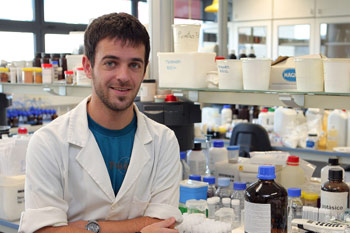Fertilizers 'tailored' to plant needs
The chemist Javier Erro has developed new, more effective and less polluting fertilizers at the University of Navarra.

The chemist Javier Erro has developed new fertilizers that are more effective and less polluting, as they are adapted to the needs of plants. The work has been carried out in the department of research and development of Timac AGRO and in the department of Chemistry and Edaphology of the University of Navarra.
The research, which has been part of his doctoral thesis , aims to find a new Philosophy of mineral nutrition of plants: "For this we took into account their metabolic potential and the chemical reactions that occur in the soil. In this way we wanted to overcome the problems of fertilization in the field, enhancing the interaction between the nutrients provided and the ability of plants to optimize them".
Thus, Javier Erro and his director at thesis , José María García-Mina, synthesized the new fertilizers (rhizosphere controlled fertilizer, RCF) at laboratory to later characterize them structurally and physicochemically with different analytical techniques. "We then studied their agronomic efficacy. The different programs of study in vitro, in hydroponics with several plants in a growth chamber, in pots, in greenhouses and in full-scale fields, have confirmed surprising results compared to conventional fertilization," says the chemist.
The fertilizer is created according to a reaction Chemistry that minimizes losses and blockages of nutrients added to the soil:"The fertilizer adapts to the needs of the plant, so that it is the plant that mobilizes the fertilizer when it needs to feed".
Savings for the field
The new system devised by the doctor at Chemistry at the University of Navarra makes fertilizers respond primarily to the demands of the crop itself, with greater independence of the environment in which it is found and the soil where it is applied. "This increases the efficiency of the nutrients added, which are currently only used by plants to about 30%," says researcher.
In addition, this optimization means reducing the pollution produced by fertilizers in soil and water. "And an economic and time saving for farmers, who have to make fewer entries in the field," adds Javier Erro.
Finally, the new formulations have given positive results even on the least efficient crops in nutrient mobilization, in any subject soil and environmental condition.
